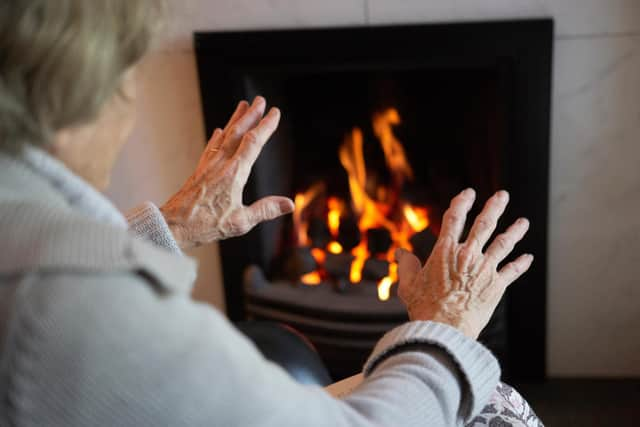Scottish ministers criticised for ‘deeply unjust’ reform of winter fuel benefit
The Scottish Government announced last week around 400,000 low income households would benefit from the guaranteed annual £50 payment, described by social security minister Ben Macpherson as a “significant increase in support”.
But amidst a worsening cost of living crisis and further price hikes in energy bills this autumn, there are warnings the new benefit, known as the low income winter heating assistance, could leave many Scots at a financial disadvantage.
Advertisement
Hide AdAdvertisement
Hide AdThe benefit is being brought in to replace the cold weather payments administered by the UK government, which triggers £25 payments whenever the average temperature is recorded as, or forecast to be, zero degrees celsius or lower for seven days in a row.
The Scottish benefit instead will see eligible households receive the £50 payment from February next year. Mr Macpherson said the devolved benefit - which will cost around £20 million a year - will provide a reliable and automatic payment irrespective of weather conditions or temperature levels.
However, Age Scotland, Citizens Advice Scotland and the Poverty Alliance are among those organisations who say ministers will leave people with less money than under the UK scheme.
Age Scotland, the national charity representing older people, said the blanket payment would not protect some vulnerable residents living in areas where winter weather can hit especially hard.
It said while the certainty of the guaranteed payment would be welcomed by many, it would also result in a large number of people seeing a reduction in their support, based on the historical triggers for cold weather payments in the past.


Its calculations, based on existing payments over the last five years, indicate as many as 17,000 people would receive less under the devolved benefit.
In 2020/21, there were three areas - Braemar, Tulloch Bridge, and Loch Glascarnoch - where there were seven cold weather triggers, with households receiving £175 in payments. A further three areas - Aboyne, Aviemore, and Eskdalemuir - saw six triggers, meaning the payments totalled £150.
In previous winters when the weather was even harsher, the payments were markedly higher. In 2012/13, for example, there were 10 separate cold spells in Braemar, meaning households received £250 towards their bills.
Advertisement
Hide AdAdvertisement
Hide AdBrain Sloan, the charity’s chief executive, said that while it welcomed the broad principle and intent behind the benefit, more could be done to help those in the coldest areas, both financially and in terms of energy efficiency improvements.
“We feel the Scottish Government could go further than a blanket payment of £50 to everyone who is eligible,” he explained.
“Of course, it is good news that more people will have some financial support which might have missed them if it wasn’t cold enough for long enough, but in the historically coldest parts of Scotland looking at the last five years at least 17,000 households, including 7,000 older households, will receive between £25 to £75 less each winter with this new benefit.
“When you look at some of the colder winters we’ve had, this figure is even higher. Based on last winter, people in the Braemar area would have lost out on £125.
“It is disappointing the Scottish Government has not recognised this and brought forward additional measures to help people in these colder areas and who will be worse off, such as enhanced payments like a cold area premium, and fixed review periods for uprating the amount of the benefit to match rises in costs of living.”
In its response to its own consultation on the new benefit, the Scottish Government said the “unpredictable nature” of weather dependent payments was one of the key drivers behind the change, and said in some cases, people have received no cold weather payments at all. It added it would only be possible to measure the “comparative value” of the new benefit in retrospect.
A press release said the plans for the benefit had been “welcomed by people with experience of the benefits system”. However, hundreds of members of the government’s own social security experience panel warned in advance that the finances underpinning the new benefit were insufficient.
Just 23 per cent of respondents to its survey said the one-off £50 sum would be suitable. Over three quarters of those who took part had previously received cold weather payments.
Advertisement
Hide AdAdvertisement
Hide AdPeter Kelly, director of the Poverty Alliance, Scotland’s anti-poverty network, said the new benefit “does not go far enough”.
“Some households in colder climates will face real term cuts to their winter heating support due to the removal of the cold spell trigger, even compared to years of milder weather,” he explained.
“This is deeply unjust. The choice to provide this payment in February instead of before winter really begins, means it will not help people through some of the coldest periods - it will merely mitigate some of the debt they will have accrued”.
Citizens Advice Scotland said its analysis indicated if the new benefit had been in place for the past decade, some vulnerable, low income consumers would have faced a fall in the level of financial support they receive by as much as 400 per cent.
“People who reside in those parts of Scotland most likely to be negatively impacted by the low income winter heating allowance are more likely to be in fuel poverty or extreme fuel poverty than the majority of those who would be perceived to gain,” the organisation said.
Comments
Want to join the conversation? Please or to comment on this article.
